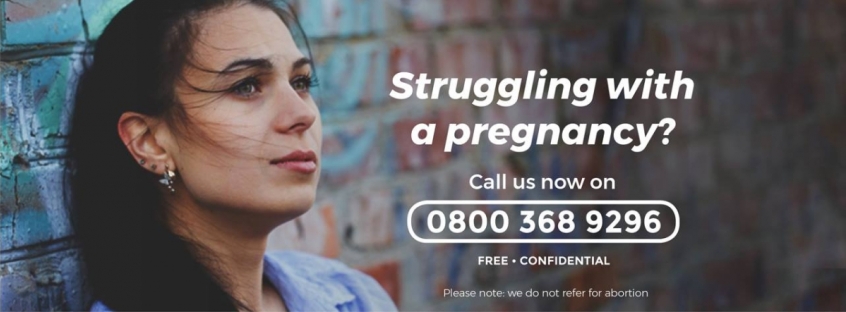
When a woman faces a crisis pregnancy, abortion may be high up in their mind. London pastor Regan King heads up the Pregnancy Crisis Helpline, which is there to let women know that they have options and that abortion need not be the answer.
Regan speaks to Christian Today about the vision behind the helpline, the needs of the women - and men - who call it, and what role the Church can play in supporting them.
CT: When someone calls the helpline, what is it that they are most commonly facing?
Regan: The helpline receives a range of calls about many different concerns. Some people call actually desiring to keep their child but they are stressed or worried about something in their relationship or something at work, and they need a safe place to talk about that and get some advice. Other people call very much with the desire to abort their child. Some have called us and asked us to book an abortion for them or provide them with pills - we don't refer anyone for abortions.
We listen to everyone who calls but we also ask them if they are aware of current legislation in the UK around abortion, which while it is commonly flouted is still the word of law and does help people to think through their reasons for an abortion and whether they've actually considered exactly what they're doing.
Other people call us because they have had an abortion and deeply regret it; they are heartbroken over it. Sometimes, they've called many years after the abortion happened. We had one caller who called us about an abortion they had 40 years ago, which is a real testimony to the enduring pain that it causes.
Whatever the case, we always seek to separate the caller from whatever external situation or consideration they're having - like their finances or a difficult relationship - from the child itself. We help them to see the two as separate issues, and that generally helps them see a little more clearly that abortion is not going to fix their problem. We help them to think about what actually can fix their problem and work through that with them.
CT: Why did you start the helpline?
Regan: Our primary goal as an organisation is to depoliticise the discussion around abortion and personalise it to show that both lives matter, that we care for the woman and the child, and desire their best. Our skilled listening and the conversations we have over the phone are all directed at really seeing the woman who calls and equipping her with the information she needs, as well as with alternatives and options she might not have considered.
In the last month alone, we had at least six women callers who were thinking about an abortion but after speaking to us, decided to keep their child. The value of a child's life is unquantifiable so it's incredible to see that impact.
CT: The UK Government allowed DIY abortions because of the pandemic. What do you think about that?
Regan: To some extent, we have had a practical state of DIY abortions for a while now. The 'pills by post' service just exacerbates the lack of security because, as was discovered in a recent Christian Legal Centre investigation, there's no criteria and there's no protocol for collecting evidence. You can literally say 'I want the pills' and they'll be sent to you. That is extremely dangerous and unsafe, and that's why we participated in a briefing session with MPs just before Christmas, giving evidence on the dangers around the pills by post service and DIY by proxy.
CT: There's been a push among abortion advocates recently, including many high-profile celebrities, to almost celebrate abortion, and campaigns like 'Shout Your Abortion' are gaining traction.
Regan: It's devastating; there's definitely a normalisation happening. Shout your Abortion actually says that abortion is normal and is essentially seeking to make abortion like a mainstream, normal form of contraception.
CT: What role does the Church have to play in helping women worried about an unplanned pregnancy see that there are alternatives to abortion?
Regan: It's crucial that the Church doesn't just say that they don't agree with abortion but be on the frontline in providing alternatives and showing that pregnancy is a positive thing. Of course, part of that means that they should also be on the frontline of advocating for the essential role of families in society and trying to get this idea of growing families once more into the mainstream.
CT: The pro-life movement in the US is very well-financed and supported by churches. Yet, here in the UK it's almost invisible, even in the Church. Why do you think there is a reluctance in the UK Church to get involved in the pro-life cause?
Regan: I think people don't understand the issue and particularly in evangelical circles, the thinking around it can be simplistic. I think there's also a desire for other people's approval to the point that we basically gloss over truth. But we also don't always speak in helpful ways or in ways that recognise the life of the child as valuable and so we'd rather not speak at all.
Even in churches, people shy away from being involved in pro-life work, but I think we need to re-frame the discussion and show that services like ours are a very positive endeavour. You don't have to march or campaign if that's not your thing but you can and should still help women and their unborn children.
CT: Picking up on what you said earlier about equipping women with information, do you find that women who call your helpline are informed about what abortion actually entails?
Regan: Many of the women callers who had abortions have been very adamant about the fact that had they known what would happen, they would not have had an abortion. And many women callers desiring to have an abortion, when asked if they know what the procedure will entail, have no idea. And so our conversations regularly involve us either helping women come to terms with the trauma of what they've experienced or aiding them with information that they've not been given about the procedure so that they are fully informed.
CT: When a man calls the helpline what issues do they normally come to the helpline with?
Regan: Many times men will call on behalf of their wife or partner. We always ask why they are the one calling and not their wife or partner and the claim in some cases is that they don't speak English and so we try to come to some arrangement where we can speak with the wife or partner. That may mean forwarding them on to local services.
In other cases men have called because there's been an affair and they're concerned about the fallout of that. They may not be directly looking for an abortion but it's on their mind. Other times there's definitely a sense of coercion and they're wanting to arrange an abortion for their partner.
In other instances, men call us because they are devastated that the child they thought they had agreed to have has been aborted. There's genuine heartache that their partner is having an abortion or had an abortion, and they are wondering what they can do. I remember one man who contacted us having had such an experience. We walked with him through the following months and he said that the service had saved his life.
CT: Do you ever pray with someone on the phone?
Regan: We don't pray with callers but at times we make referrals to Christians or churches where that's deemed appropriate. I know from some of the referrals we've made that some people have been very grateful for the support they have received from the church or a Christian.
During our calls, we will often mention to the callers that their emotional and spiritual wellbeing needs to be a factor in their decision. They need to consider their physical health and wellbeing, their emotional health and wellbeing, their financial health and wellbeing, and their spiritual health and wellbeing. It's important that people go into this decision fully aware of the consequences across all the facets of their life because it really will impact all of these.
CT: Has the pandemic had any impact on people calling the helpline?
Regan: Yes, we have had an increase in calls, some of which have related directly to conceiving during lockdown or others because they had an abortion as a result of the pills by post service.
CT: You are running webinars with churches to raise awareness of your work and encourage them to get involved. How can churches support what you are doing?
Regan: Churches and individual Christians can get involved by volunteering, being ambassadors for the charity, or giving financially. It's important that Christians really think through how we can impact the lives of men and women affected by crisis pregnancies in our communities, and it's so essential that we're practical in this.
A lot of talk has gone on over the years and that is probably why the pro-life movement has lacked steam in evangelical circles here in the UK, because there's been a lot of talk but there's not necessarily been a lot of action. We want to serve as a conduit for people to really act and get involved.
The Pregnancy Crisis Helpline is available free, confidential and available Monday to Friday from 9am to 5pm on 0800 368 9296.













